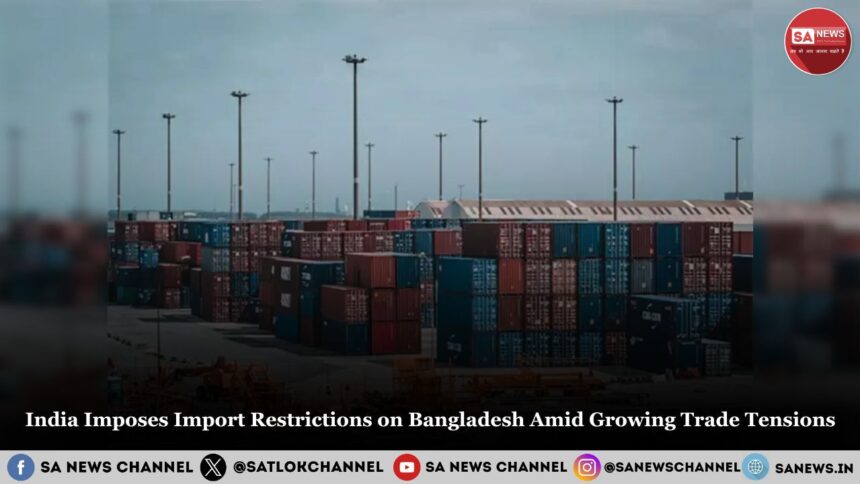India has recently placed new import restrictions on several products coming from Bangladesh. These include:
- Background: Growing Diplomatic and Economic Tensions
- Impact on Trade Between India and Bangladesh
- Regional Trade and Geopolitical Context
- Challenges and Risks
- Increased Export Costs for Bangladesh
- Supply Chain Interruptions
- Worsening Diplomatic Relations
- Impact on Employment
- Potential for Further Retaliation
- Prospects for Dialogue and Resolution
- Importance of Cooperation
- Conclusion
- Ready-made garments (clothes that are already made and ready to wear)
- Processed foods
- Plastic goods
- Wooden furniture
Because of these new rules, Bangladesh can no longer send these goods through land border ports. Instead, exporters must use selected seaports. This affects around $770 million worth of trade, which is almost 42% of all imports from Bangladesh to India.
Background: Growing Diplomatic and Economic Tensions
The new import restrictions come amid increasing diplomatic tensions between India and Bangladesh. Bangladesh has been strengthening ties with China, causing concern in India. Muhammad Yunus, Bangladesh’s Chief Adviser, has promoted closer economic cooperation with China. This has led to $2.1 billion in new Chinese investments in Bangladesh.
India’s action is a reaction to Bangladesh’s restrictions on various Indian goods such as yarn, rice, paper, and fish.. This back-and-forth trade restriction has increased tensions and led both countries to impose barriers on each other’s goods.
Impact on Trade Between India and Bangladesh
Disruption of Trade Flow
The restrictions disrupt the flow of goods from Bangladesh to India. Many Bangladeshi products, especially ready-made garments and processed foods, now face difficulties reaching Indian markets.
Increased Costs and Delays
Land border ports allowed for quicker and cheaper shipments. Now, exporters must use seaports, which can cause higher shipping costs and delays. India is wary of China’s increasing power in Bangladesh and the surrounding area.
Effect on Businesses and Consumers
Trade disruptions affect businesses that depend on smooth supply chains. Consumers may also face shortages or higher prices for some goods.
Regional Trade and Geopolitical Context
South Asia has a long history of economic and cultural connections. Trade helps strengthen cooperation and growth in the region. However, political issues sometimes spill over into trade relations.India is wary of China’s increasing power in Bangladesh and the surrounding area.The trade restrictions reflect deeper geopolitical shifts and could change how South Asian countries trade with each other.
Challenges and Risks
Increased Export Costs for Bangladesh
Bangladeshi exporters face higher costs due to longer and more complicated shipping routes.
Supply Chain Interruptions
Many industries rely on fast, reliable trade. Disruptions can lead to delays, affecting both producers and consumers.
Worsening Diplomatic Relations
Trade conflicts reduce trust between India and Bangladesh, making future cooperation more difficult.
Impact on Employment
Reduced exports may cause job losses in Bangladesh’s manufacturing and food processing sectors.
Potential for Further Retaliation
If tensions continue, more restrictions or tariffs could be imposed, deepening the trade conflict.
Prospects for Dialogue and Resolution
Despite tensions, Bangladesh has expressed a willingness to resolve trade issues through talks. Officials aim to talk about how to enhance collaboration with India.
So far, no official meetings have been scheduled. Both countries need to open dialogue soon to prevent further damage.
Importance of Cooperation
Trade ties are vital for peace and prosperity in South Asia. Improved communication and understanding can help both countries protect their economic interests while maintaining friendly relations.
Conclusion
India’s import restrictions on Bangladesh mark a difficult chapter in their trade relationship. These limits disrupt a significant portion of bilateral trade and reflect wider diplomatic challenges tied to Bangladesh’s growing ties with China.
While the restrictions create problems for exporters and businesses, they highlight the urgent need for dialogue. Both countries risk losing out if the dispute escalates. To support their people’s economic well-being and regional stability, India and Bangladesh must work together to resolve these trade issues.
Sant Rampal Ji’s teachings highlight the importance of peace, patience, and mutual respect in resolving conflicts. In the context of the India-Bangladesh trade tensions, his wisdom reminds us that lasting progress comes through understanding and dialogue, not barriers or retaliation. Both nations can benefit by embracing compassion and working together to resolve differences peacefully. By following these principles, India and Bangladesh can strengthen their ties, promote regional stability, and ensure economic growth that serves all people. Sant Rampal Ji’s guidance encourages leaders to choose cooperation over conflict for a harmonious future.








![Metrics to Mastery Achieving Success in Customer Acquisition [2024]](https://santrampalji-files.sgp1.digitaloceanspaces.com/sanews.in/2024/12/15122320/Metrics-to-Mastery-Achieving-Success-in-Customer-Acquisition-2024-330x220.jpg)
